Emotional Intelligence and Workplace Relationships Analysis
VerifiedAdded on 2020/05/16
|13
|2373
|248
Report
AI Summary
This report delves into the concept of emotional intelligence (EI) and its application within a workplace setting. It begins by defining EI and outlining its core principles, including self-awareness, self-control, adaptability, empathy, and conflict management. The report then examines how EI impacts workplace relationships, highlighting the benefits of emotionally effective individuals in achieving business objectives and fostering a positive work environment. The author analyzes how their own emotions affect colleagues, proposes strategies for improving EI, and assesses the emotional strengths and weaknesses of key workplace figures, such as a manager and a waiter. The report further explores personal emotional strengths and weaknesses, common workplace stressors, and triggers for emotional responses, along with reflective practices and emotional cues. It discusses the influence of culture on emotional expression and the use of the ladder of inference. Finally, the report outlines steps for developing EI in others, emphasizing the importance of setting expectations, providing support, empowering employees, and offering positive feedback.
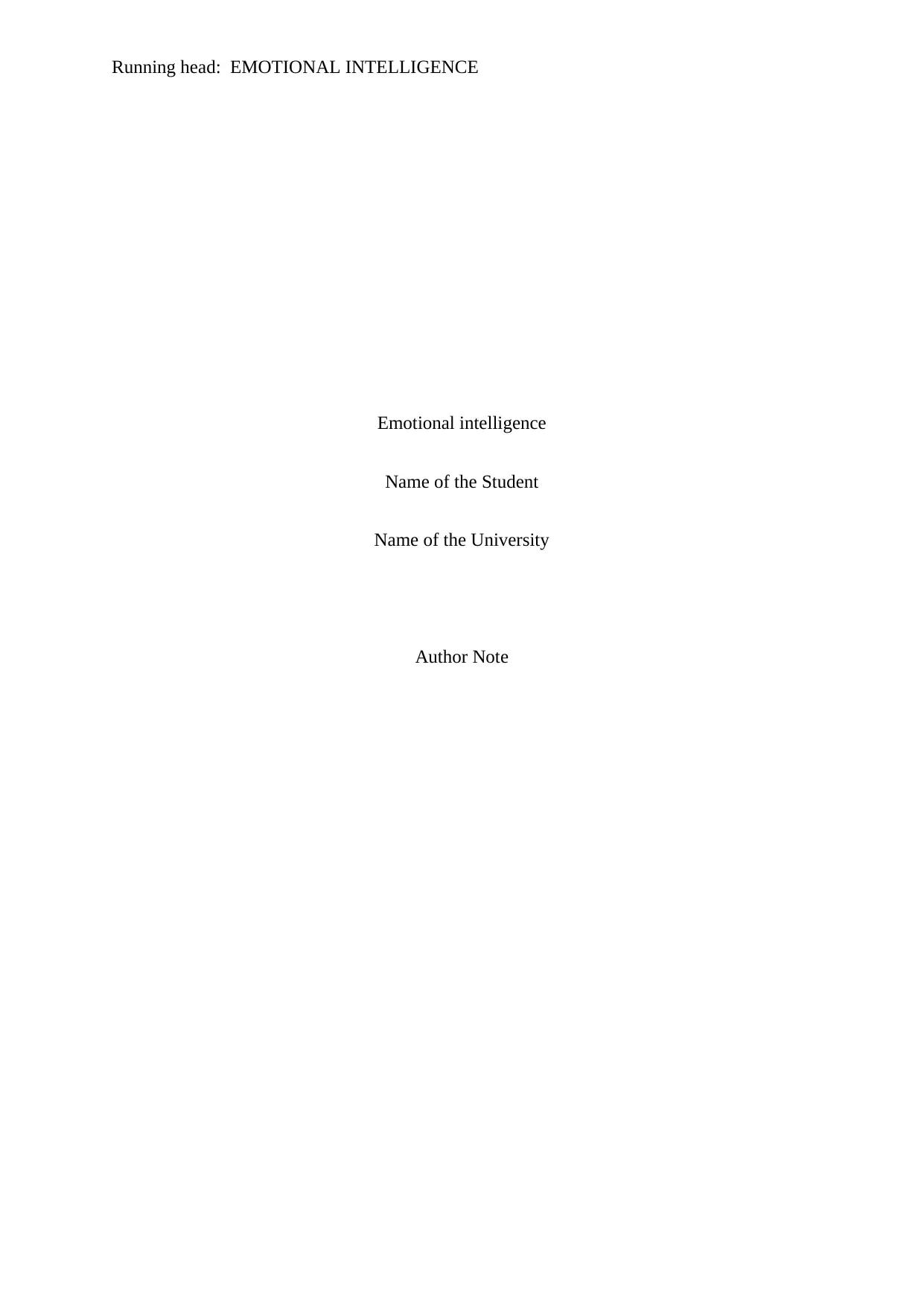
Running head: EMOTIONAL INTELLIGENCE
Emotional intelligence
Name of the Student
Name of the University
Author Note
Emotional intelligence
Name of the Student
Name of the University
Author Note
Paraphrase This Document
Need a fresh take? Get an instant paraphrase of this document with our AI Paraphraser
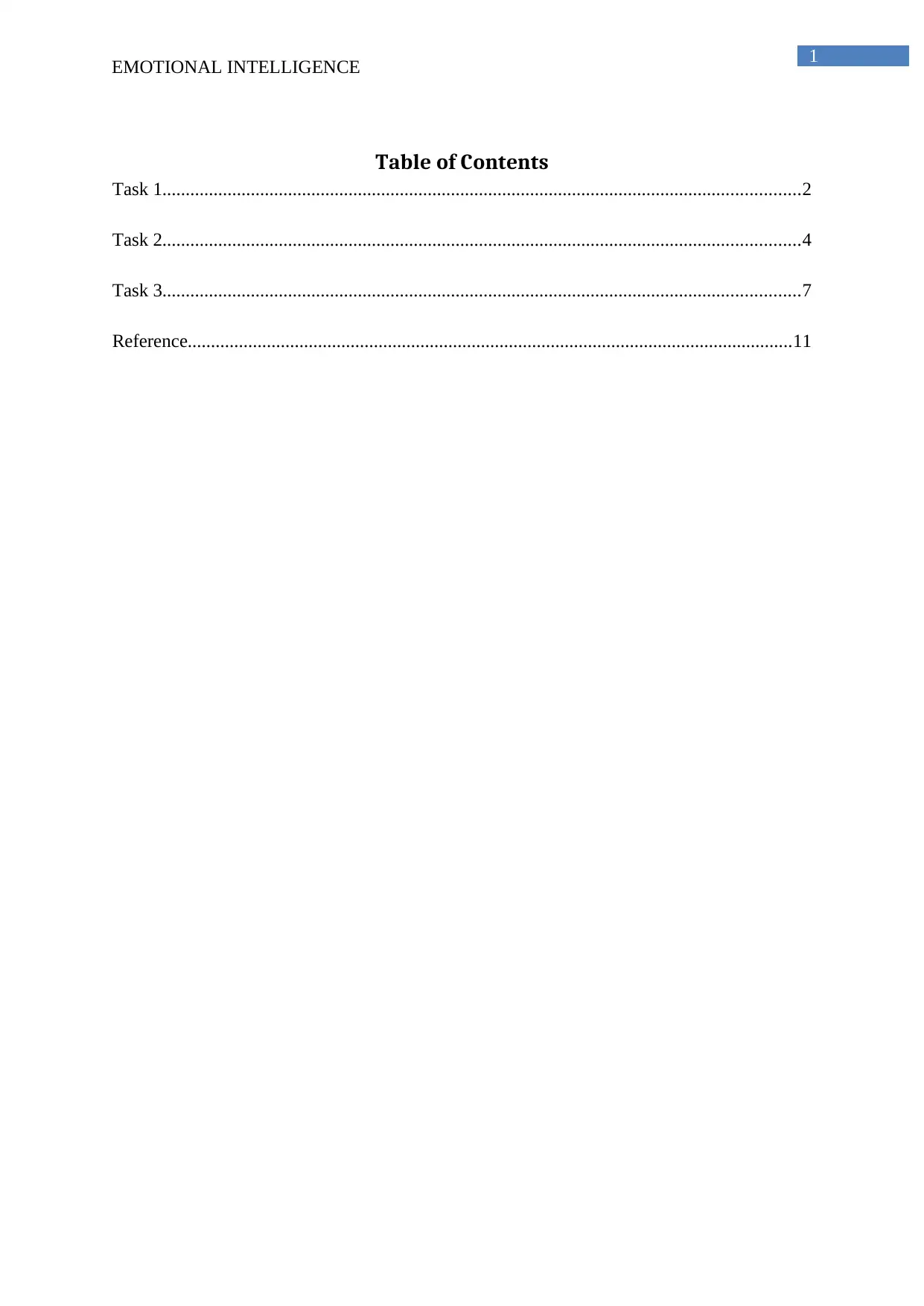
1
EMOTIONAL INTELLIGENCE
Table of Contents
Task 1.........................................................................................................................................2
Task 2.........................................................................................................................................4
Task 3.........................................................................................................................................7
Reference..................................................................................................................................11
EMOTIONAL INTELLIGENCE
Table of Contents
Task 1.........................................................................................................................................2
Task 2.........................................................................................................................................4
Task 3.........................................................................................................................................7
Reference..................................................................................................................................11
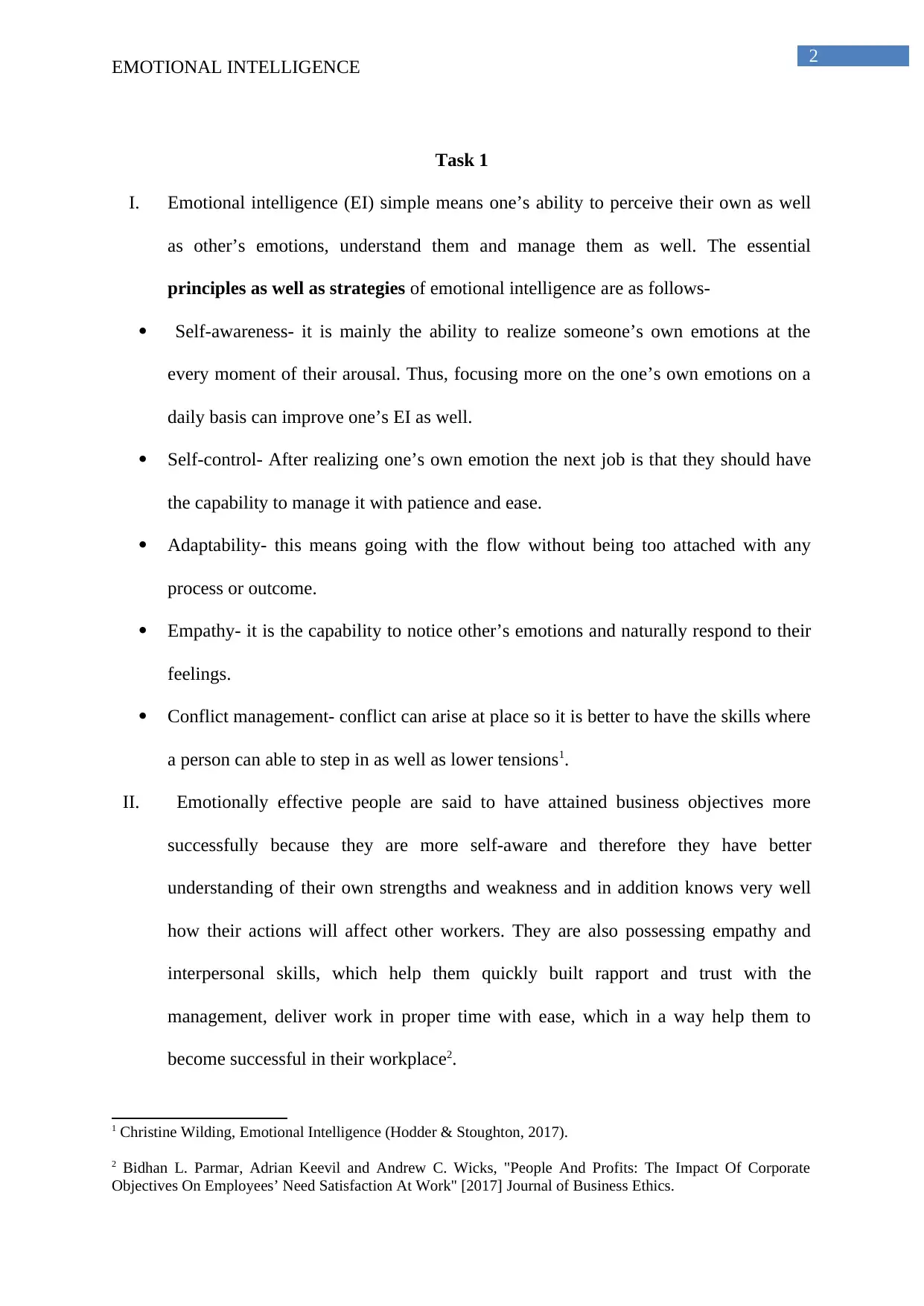
2
EMOTIONAL INTELLIGENCE
Task 1
I. Emotional intelligence (EI) simple means one’s ability to perceive their own as well
as other’s emotions, understand them and manage them as well. The essential
principles as well as strategies of emotional intelligence are as follows-
Self-awareness- it is mainly the ability to realize someone’s own emotions at the
every moment of their arousal. Thus, focusing more on the one’s own emotions on a
daily basis can improve one’s EI as well.
Self-control- After realizing one’s own emotion the next job is that they should have
the capability to manage it with patience and ease.
Adaptability- this means going with the flow without being too attached with any
process or outcome.
Empathy- it is the capability to notice other’s emotions and naturally respond to their
feelings.
Conflict management- conflict can arise at place so it is better to have the skills where
a person can able to step in as well as lower tensions1.
II. Emotionally effective people are said to have attained business objectives more
successfully because they are more self-aware and therefore they have better
understanding of their own strengths and weakness and in addition knows very well
how their actions will affect other workers. They are also possessing empathy and
interpersonal skills, which help them quickly built rapport and trust with the
management, deliver work in proper time with ease, which in a way help them to
become successful in their workplace2.
1 Christine Wilding, Emotional Intelligence (Hodder & Stoughton, 2017).
2 Bidhan L. Parmar, Adrian Keevil and Andrew C. Wicks, "People And Profits: The Impact Of Corporate
Objectives On Employees’ Need Satisfaction At Work" [2017] Journal of Business Ethics.
EMOTIONAL INTELLIGENCE
Task 1
I. Emotional intelligence (EI) simple means one’s ability to perceive their own as well
as other’s emotions, understand them and manage them as well. The essential
principles as well as strategies of emotional intelligence are as follows-
Self-awareness- it is mainly the ability to realize someone’s own emotions at the
every moment of their arousal. Thus, focusing more on the one’s own emotions on a
daily basis can improve one’s EI as well.
Self-control- After realizing one’s own emotion the next job is that they should have
the capability to manage it with patience and ease.
Adaptability- this means going with the flow without being too attached with any
process or outcome.
Empathy- it is the capability to notice other’s emotions and naturally respond to their
feelings.
Conflict management- conflict can arise at place so it is better to have the skills where
a person can able to step in as well as lower tensions1.
II. Emotionally effective people are said to have attained business objectives more
successfully because they are more self-aware and therefore they have better
understanding of their own strengths and weakness and in addition knows very well
how their actions will affect other workers. They are also possessing empathy and
interpersonal skills, which help them quickly built rapport and trust with the
management, deliver work in proper time with ease, which in a way help them to
become successful in their workplace2.
1 Christine Wilding, Emotional Intelligence (Hodder & Stoughton, 2017).
2 Bidhan L. Parmar, Adrian Keevil and Andrew C. Wicks, "People And Profits: The Impact Of Corporate
Objectives On Employees’ Need Satisfaction At Work" [2017] Journal of Business Ethics.
⊘ This is a preview!⊘
Do you want full access?
Subscribe today to unlock all pages.

Trusted by 1+ million students worldwide
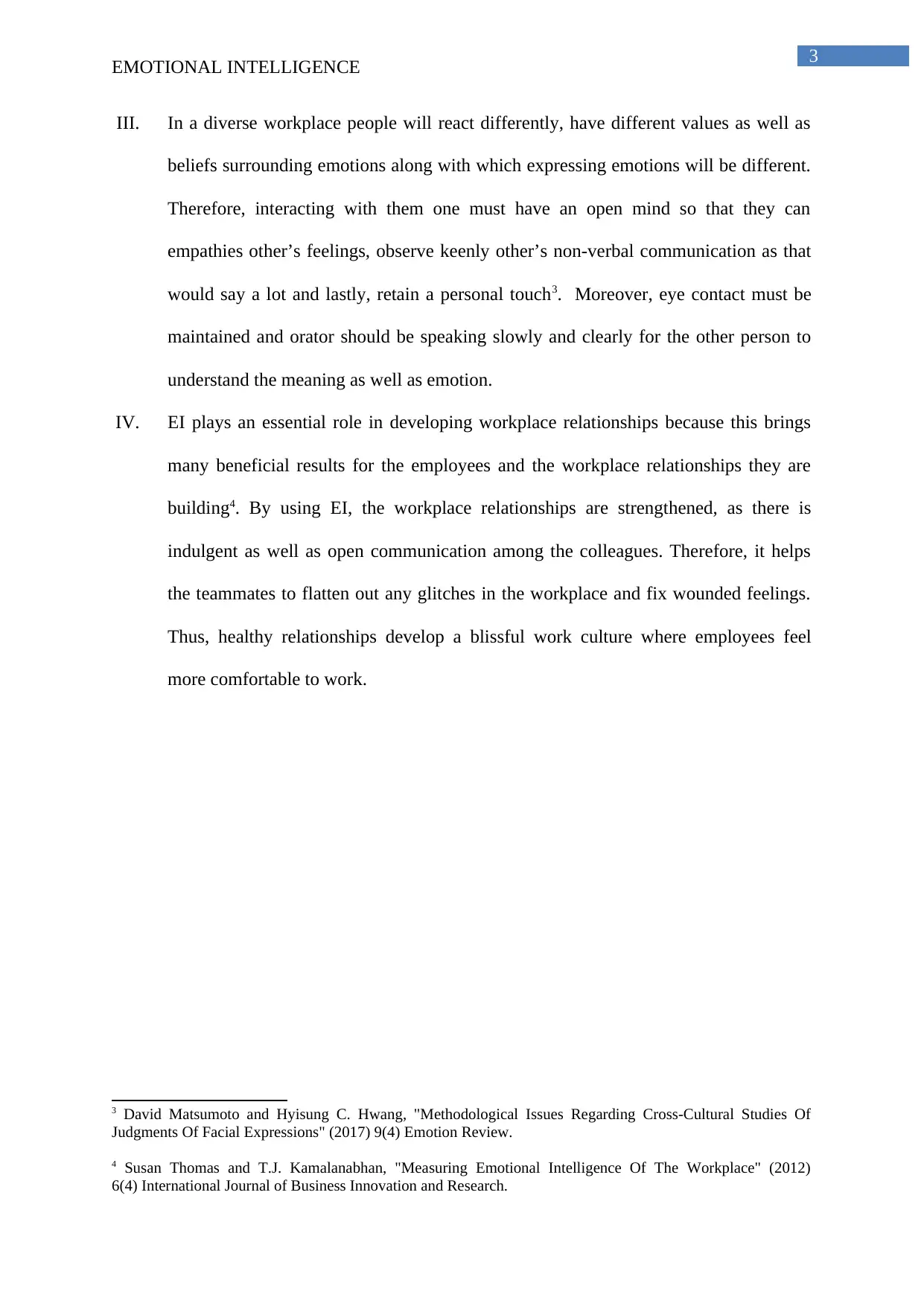
3
EMOTIONAL INTELLIGENCE
III. In a diverse workplace people will react differently, have different values as well as
beliefs surrounding emotions along with which expressing emotions will be different.
Therefore, interacting with them one must have an open mind so that they can
empathies other’s feelings, observe keenly other’s non-verbal communication as that
would say a lot and lastly, retain a personal touch3. Moreover, eye contact must be
maintained and orator should be speaking slowly and clearly for the other person to
understand the meaning as well as emotion.
IV. EI plays an essential role in developing workplace relationships because this brings
many beneficial results for the employees and the workplace relationships they are
building4. By using EI, the workplace relationships are strengthened, as there is
indulgent as well as open communication among the colleagues. Therefore, it helps
the teammates to flatten out any glitches in the workplace and fix wounded feelings.
Thus, healthy relationships develop a blissful work culture where employees feel
more comfortable to work.
3 David Matsumoto and Hyisung C. Hwang, "Methodological Issues Regarding Cross-Cultural Studies Of
Judgments Of Facial Expressions" (2017) 9(4) Emotion Review.
4 Susan Thomas and T.J. Kamalanabhan, "Measuring Emotional Intelligence Of The Workplace" (2012)
6(4) International Journal of Business Innovation and Research.
EMOTIONAL INTELLIGENCE
III. In a diverse workplace people will react differently, have different values as well as
beliefs surrounding emotions along with which expressing emotions will be different.
Therefore, interacting with them one must have an open mind so that they can
empathies other’s feelings, observe keenly other’s non-verbal communication as that
would say a lot and lastly, retain a personal touch3. Moreover, eye contact must be
maintained and orator should be speaking slowly and clearly for the other person to
understand the meaning as well as emotion.
IV. EI plays an essential role in developing workplace relationships because this brings
many beneficial results for the employees and the workplace relationships they are
building4. By using EI, the workplace relationships are strengthened, as there is
indulgent as well as open communication among the colleagues. Therefore, it helps
the teammates to flatten out any glitches in the workplace and fix wounded feelings.
Thus, healthy relationships develop a blissful work culture where employees feel
more comfortable to work.
3 David Matsumoto and Hyisung C. Hwang, "Methodological Issues Regarding Cross-Cultural Studies Of
Judgments Of Facial Expressions" (2017) 9(4) Emotion Review.
4 Susan Thomas and T.J. Kamalanabhan, "Measuring Emotional Intelligence Of The Workplace" (2012)
6(4) International Journal of Business Innovation and Research.
Paraphrase This Document
Need a fresh take? Get an instant paraphrase of this document with our AI Paraphraser
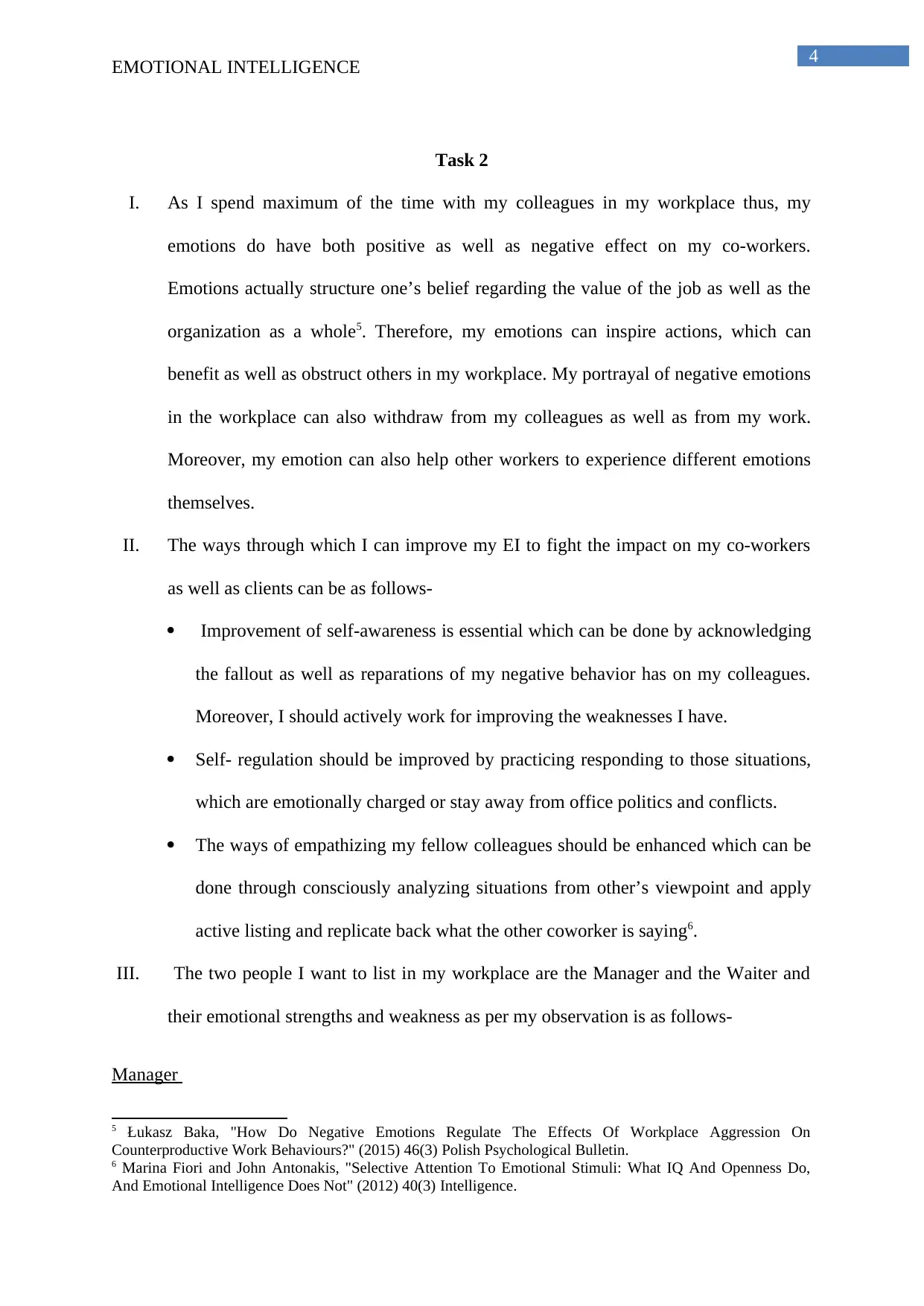
4
EMOTIONAL INTELLIGENCE
Task 2
I. As I spend maximum of the time with my colleagues in my workplace thus, my
emotions do have both positive as well as negative effect on my co-workers.
Emotions actually structure one’s belief regarding the value of the job as well as the
organization as a whole5. Therefore, my emotions can inspire actions, which can
benefit as well as obstruct others in my workplace. My portrayal of negative emotions
in the workplace can also withdraw from my colleagues as well as from my work.
Moreover, my emotion can also help other workers to experience different emotions
themselves.
II. The ways through which I can improve my EI to fight the impact on my co-workers
as well as clients can be as follows-
Improvement of self-awareness is essential which can be done by acknowledging
the fallout as well as reparations of my negative behavior has on my colleagues.
Moreover, I should actively work for improving the weaknesses I have.
Self- regulation should be improved by practicing responding to those situations,
which are emotionally charged or stay away from office politics and conflicts.
The ways of empathizing my fellow colleagues should be enhanced which can be
done through consciously analyzing situations from other’s viewpoint and apply
active listing and replicate back what the other coworker is saying6.
III. The two people I want to list in my workplace are the Manager and the Waiter and
their emotional strengths and weakness as per my observation is as follows-
Manager
5 Łukasz Baka, "How Do Negative Emotions Regulate The Effects Of Workplace Aggression On
Counterproductive Work Behaviours?" (2015) 46(3) Polish Psychological Bulletin.
6 Marina Fiori and John Antonakis, "Selective Attention To Emotional Stimuli: What IQ And Openness Do,
And Emotional Intelligence Does Not" (2012) 40(3) Intelligence.
EMOTIONAL INTELLIGENCE
Task 2
I. As I spend maximum of the time with my colleagues in my workplace thus, my
emotions do have both positive as well as negative effect on my co-workers.
Emotions actually structure one’s belief regarding the value of the job as well as the
organization as a whole5. Therefore, my emotions can inspire actions, which can
benefit as well as obstruct others in my workplace. My portrayal of negative emotions
in the workplace can also withdraw from my colleagues as well as from my work.
Moreover, my emotion can also help other workers to experience different emotions
themselves.
II. The ways through which I can improve my EI to fight the impact on my co-workers
as well as clients can be as follows-
Improvement of self-awareness is essential which can be done by acknowledging
the fallout as well as reparations of my negative behavior has on my colleagues.
Moreover, I should actively work for improving the weaknesses I have.
Self- regulation should be improved by practicing responding to those situations,
which are emotionally charged or stay away from office politics and conflicts.
The ways of empathizing my fellow colleagues should be enhanced which can be
done through consciously analyzing situations from other’s viewpoint and apply
active listing and replicate back what the other coworker is saying6.
III. The two people I want to list in my workplace are the Manager and the Waiter and
their emotional strengths and weakness as per my observation is as follows-
Manager
5 Łukasz Baka, "How Do Negative Emotions Regulate The Effects Of Workplace Aggression On
Counterproductive Work Behaviours?" (2015) 46(3) Polish Psychological Bulletin.
6 Marina Fiori and John Antonakis, "Selective Attention To Emotional Stimuli: What IQ And Openness Do,
And Emotional Intelligence Does Not" (2012) 40(3) Intelligence.
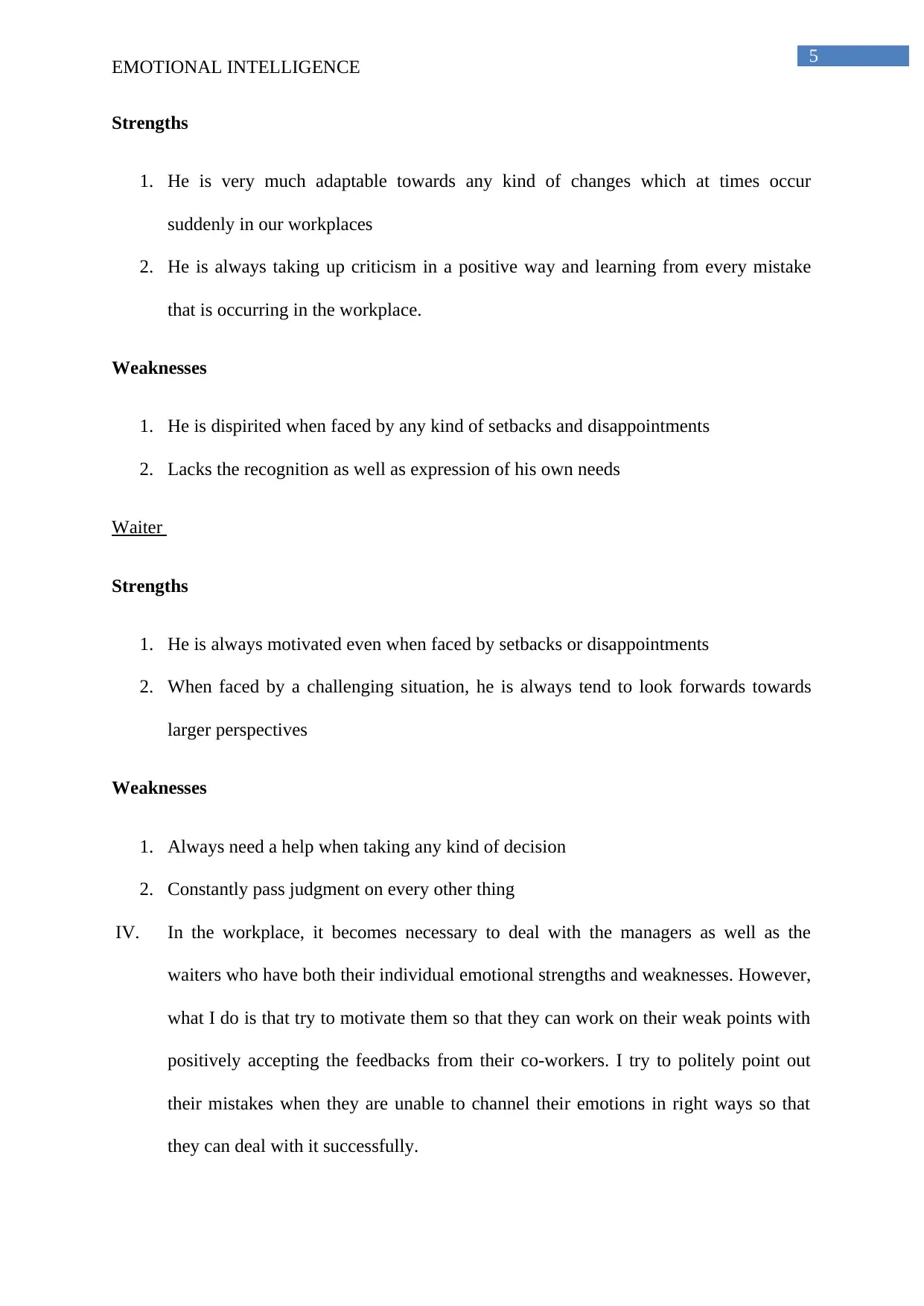
5
EMOTIONAL INTELLIGENCE
Strengths
1. He is very much adaptable towards any kind of changes which at times occur
suddenly in our workplaces
2. He is always taking up criticism in a positive way and learning from every mistake
that is occurring in the workplace.
Weaknesses
1. He is dispirited when faced by any kind of setbacks and disappointments
2. Lacks the recognition as well as expression of his own needs
Waiter
Strengths
1. He is always motivated even when faced by setbacks or disappointments
2. When faced by a challenging situation, he is always tend to look forwards towards
larger perspectives
Weaknesses
1. Always need a help when taking any kind of decision
2. Constantly pass judgment on every other thing
IV. In the workplace, it becomes necessary to deal with the managers as well as the
waiters who have both their individual emotional strengths and weaknesses. However,
what I do is that try to motivate them so that they can work on their weak points with
positively accepting the feedbacks from their co-workers. I try to politely point out
their mistakes when they are unable to channel their emotions in right ways so that
they can deal with it successfully.
EMOTIONAL INTELLIGENCE
Strengths
1. He is very much adaptable towards any kind of changes which at times occur
suddenly in our workplaces
2. He is always taking up criticism in a positive way and learning from every mistake
that is occurring in the workplace.
Weaknesses
1. He is dispirited when faced by any kind of setbacks and disappointments
2. Lacks the recognition as well as expression of his own needs
Waiter
Strengths
1. He is always motivated even when faced by setbacks or disappointments
2. When faced by a challenging situation, he is always tend to look forwards towards
larger perspectives
Weaknesses
1. Always need a help when taking any kind of decision
2. Constantly pass judgment on every other thing
IV. In the workplace, it becomes necessary to deal with the managers as well as the
waiters who have both their individual emotional strengths and weaknesses. However,
what I do is that try to motivate them so that they can work on their weak points with
positively accepting the feedbacks from their co-workers. I try to politely point out
their mistakes when they are unable to channel their emotions in right ways so that
they can deal with it successfully.
⊘ This is a preview!⊘
Do you want full access?
Subscribe today to unlock all pages.

Trusted by 1+ million students worldwide
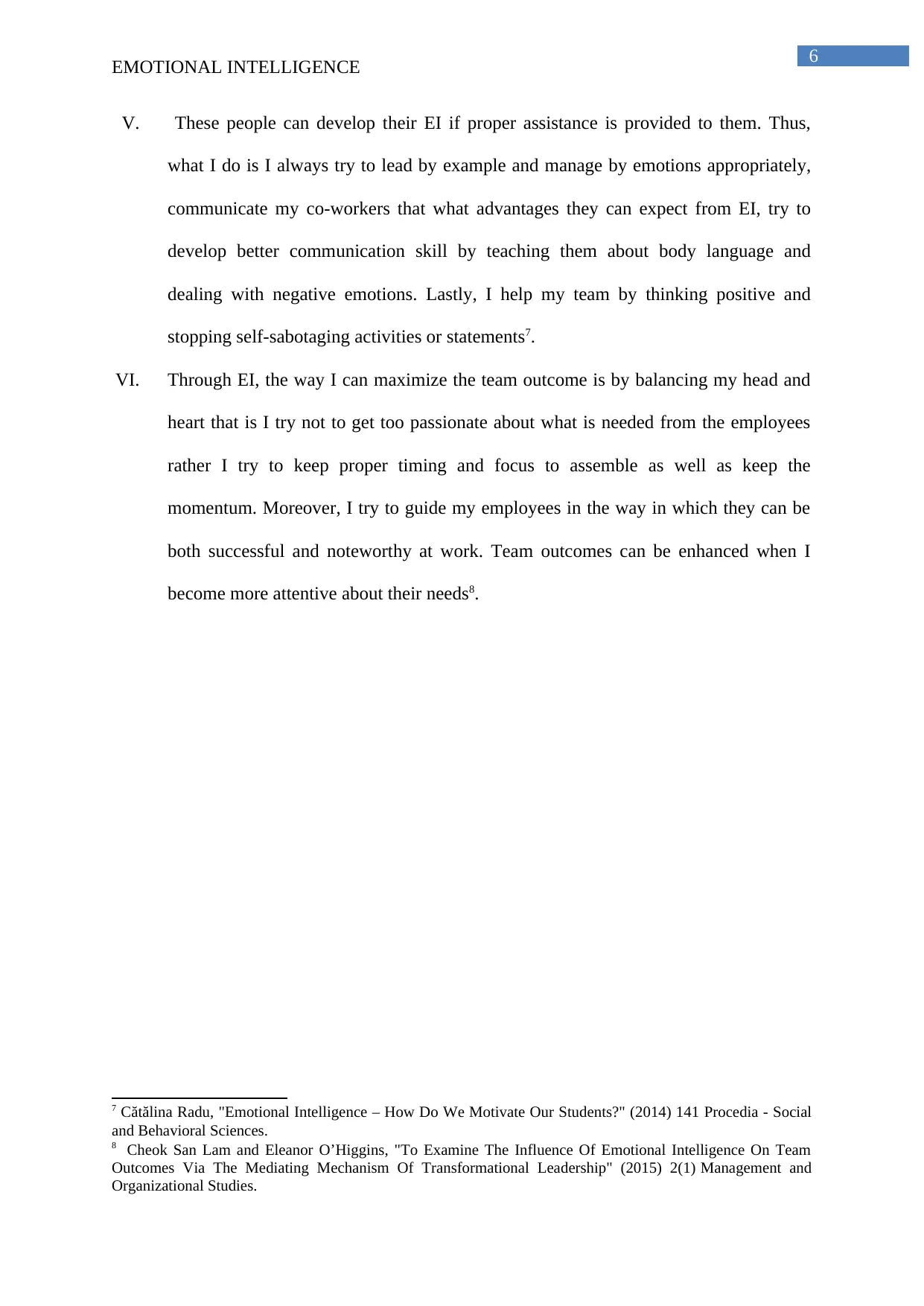
6
EMOTIONAL INTELLIGENCE
V. These people can develop their EI if proper assistance is provided to them. Thus,
what I do is I always try to lead by example and manage by emotions appropriately,
communicate my co-workers that what advantages they can expect from EI, try to
develop better communication skill by teaching them about body language and
dealing with negative emotions. Lastly, I help my team by thinking positive and
stopping self-sabotaging activities or statements7.
VI. Through EI, the way I can maximize the team outcome is by balancing my head and
heart that is I try not to get too passionate about what is needed from the employees
rather I try to keep proper timing and focus to assemble as well as keep the
momentum. Moreover, I try to guide my employees in the way in which they can be
both successful and noteworthy at work. Team outcomes can be enhanced when I
become more attentive about their needs8.
7 Cătălina Radu, "Emotional Intelligence – How Do We Motivate Our Students?" (2014) 141 Procedia - Social
and Behavioral Sciences.
8 Cheok San Lam and Eleanor O’Higgins, "To Examine The Influence Of Emotional Intelligence On Team
Outcomes Via The Mediating Mechanism Of Transformational Leadership" (2015) 2(1) Management and
Organizational Studies.
EMOTIONAL INTELLIGENCE
V. These people can develop their EI if proper assistance is provided to them. Thus,
what I do is I always try to lead by example and manage by emotions appropriately,
communicate my co-workers that what advantages they can expect from EI, try to
develop better communication skill by teaching them about body language and
dealing with negative emotions. Lastly, I help my team by thinking positive and
stopping self-sabotaging activities or statements7.
VI. Through EI, the way I can maximize the team outcome is by balancing my head and
heart that is I try not to get too passionate about what is needed from the employees
rather I try to keep proper timing and focus to assemble as well as keep the
momentum. Moreover, I try to guide my employees in the way in which they can be
both successful and noteworthy at work. Team outcomes can be enhanced when I
become more attentive about their needs8.
7 Cătălina Radu, "Emotional Intelligence – How Do We Motivate Our Students?" (2014) 141 Procedia - Social
and Behavioral Sciences.
8 Cheok San Lam and Eleanor O’Higgins, "To Examine The Influence Of Emotional Intelligence On Team
Outcomes Via The Mediating Mechanism Of Transformational Leadership" (2015) 2(1) Management and
Organizational Studies.
Paraphrase This Document
Need a fresh take? Get an instant paraphrase of this document with our AI Paraphraser
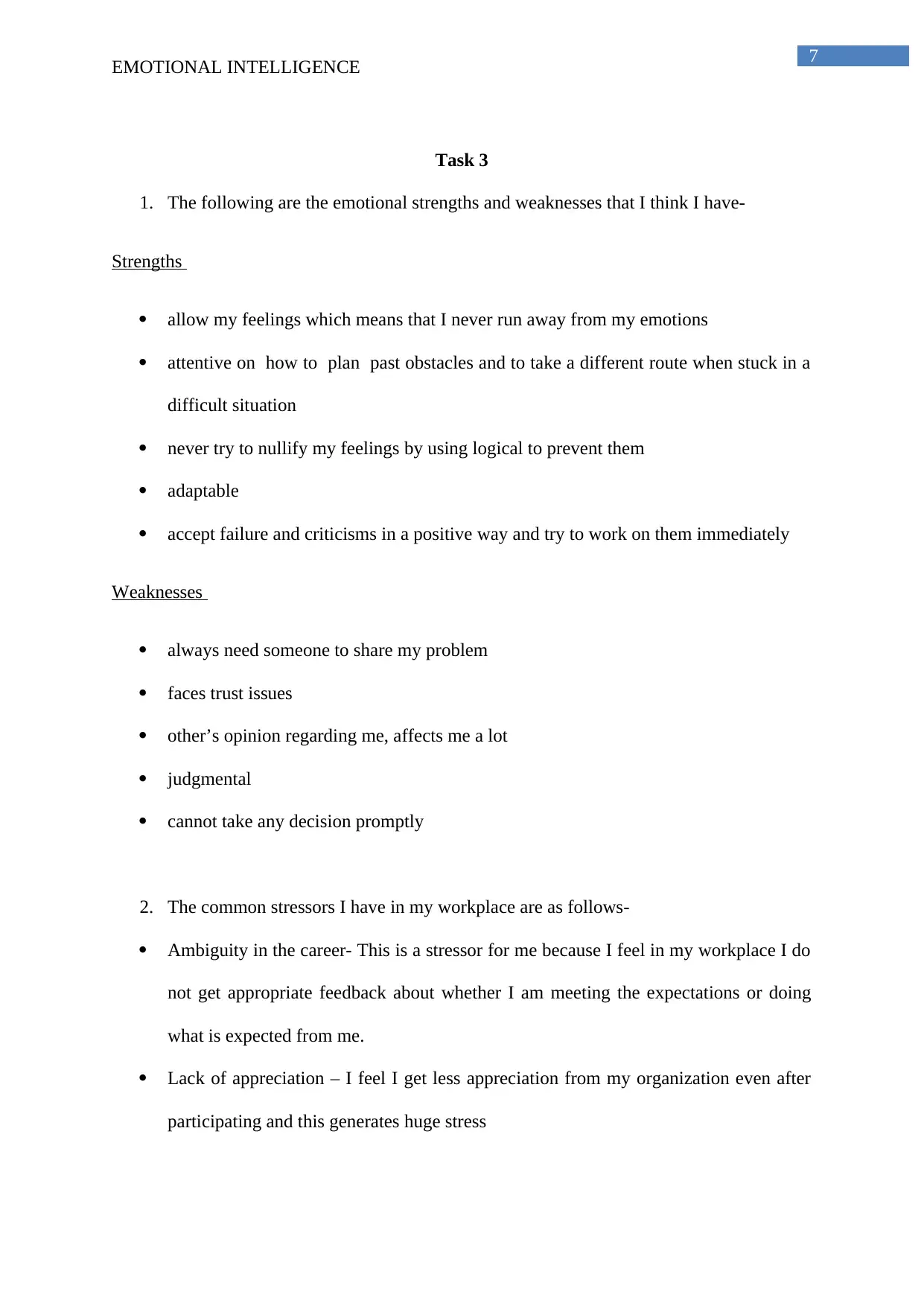
7
EMOTIONAL INTELLIGENCE
Task 3
1. The following are the emotional strengths and weaknesses that I think I have-
Strengths
allow my feelings which means that I never run away from my emotions
attentive on how to plan past obstacles and to take a different route when stuck in a
difficult situation
never try to nullify my feelings by using logical to prevent them
adaptable
accept failure and criticisms in a positive way and try to work on them immediately
Weaknesses
always need someone to share my problem
faces trust issues
other’s opinion regarding me, affects me a lot
judgmental
cannot take any decision promptly
2. The common stressors I have in my workplace are as follows-
Ambiguity in the career- This is a stressor for me because I feel in my workplace I do
not get appropriate feedback about whether I am meeting the expectations or doing
what is expected from me.
Lack of appreciation – I feel I get less appreciation from my organization even after
participating and this generates huge stress
EMOTIONAL INTELLIGENCE
Task 3
1. The following are the emotional strengths and weaknesses that I think I have-
Strengths
allow my feelings which means that I never run away from my emotions
attentive on how to plan past obstacles and to take a different route when stuck in a
difficult situation
never try to nullify my feelings by using logical to prevent them
adaptable
accept failure and criticisms in a positive way and try to work on them immediately
Weaknesses
always need someone to share my problem
faces trust issues
other’s opinion regarding me, affects me a lot
judgmental
cannot take any decision promptly
2. The common stressors I have in my workplace are as follows-
Ambiguity in the career- This is a stressor for me because I feel in my workplace I do
not get appropriate feedback about whether I am meeting the expectations or doing
what is expected from me.
Lack of appreciation – I feel I get less appreciation from my organization even after
participating and this generates huge stress
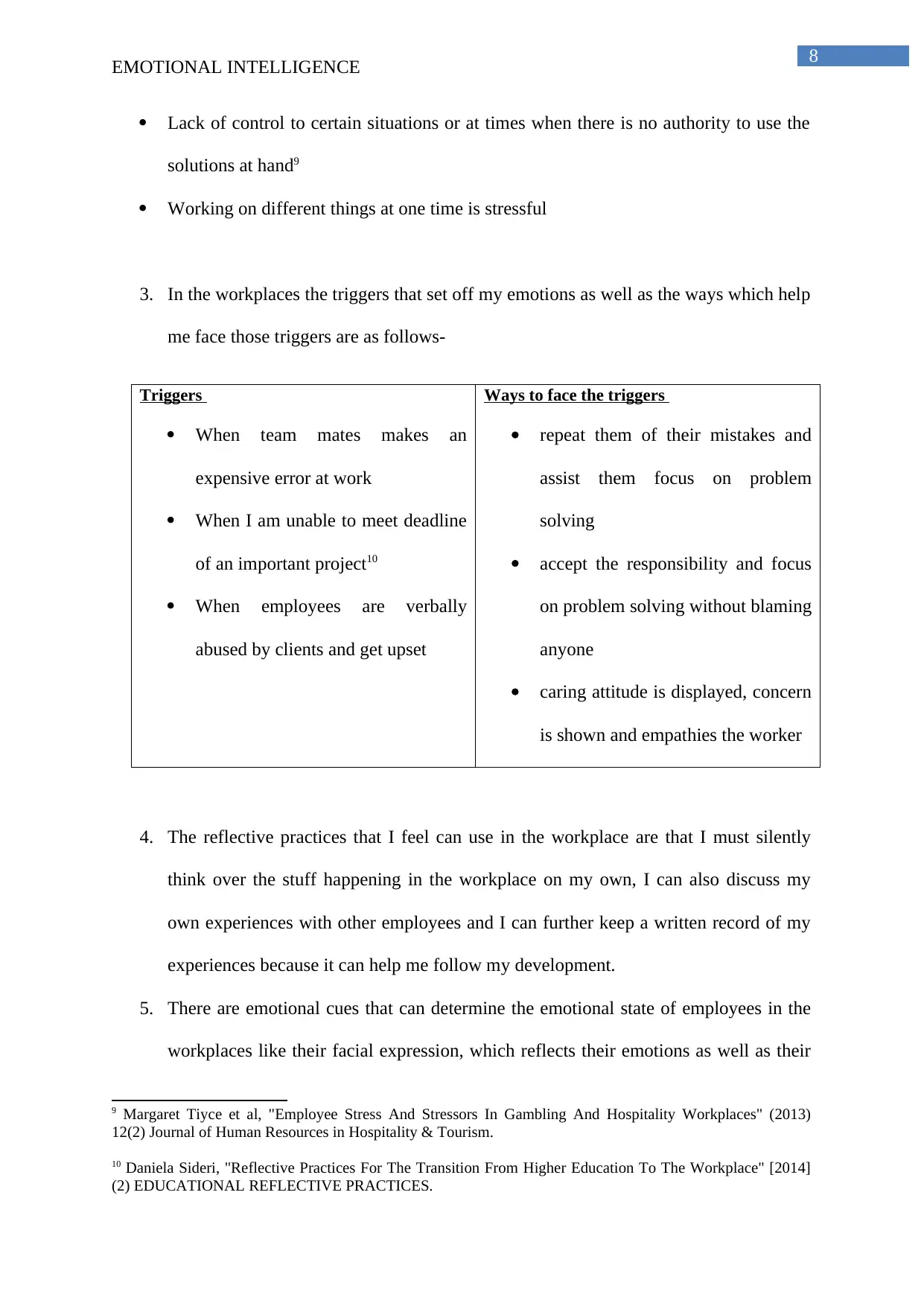
8
EMOTIONAL INTELLIGENCE
Lack of control to certain situations or at times when there is no authority to use the
solutions at hand9
Working on different things at one time is stressful
3. In the workplaces the triggers that set off my emotions as well as the ways which help
me face those triggers are as follows-
Triggers
When team mates makes an
expensive error at work
When I am unable to meet deadline
of an important project10
When employees are verbally
abused by clients and get upset
Ways to face the triggers
repeat them of their mistakes and
assist them focus on problem
solving
accept the responsibility and focus
on problem solving without blaming
anyone
caring attitude is displayed, concern
is shown and empathies the worker
4. The reflective practices that I feel can use in the workplace are that I must silently
think over the stuff happening in the workplace on my own, I can also discuss my
own experiences with other employees and I can further keep a written record of my
experiences because it can help me follow my development.
5. There are emotional cues that can determine the emotional state of employees in the
workplaces like their facial expression, which reflects their emotions as well as their
9 Margaret Tiyce et al, "Employee Stress And Stressors In Gambling And Hospitality Workplaces" (2013)
12(2) Journal of Human Resources in Hospitality & Tourism.
10 Daniela Sideri, "Reflective Practices For The Transition From Higher Education To The Workplace" [2014]
(2) EDUCATIONAL REFLECTIVE PRACTICES.
EMOTIONAL INTELLIGENCE
Lack of control to certain situations or at times when there is no authority to use the
solutions at hand9
Working on different things at one time is stressful
3. In the workplaces the triggers that set off my emotions as well as the ways which help
me face those triggers are as follows-
Triggers
When team mates makes an
expensive error at work
When I am unable to meet deadline
of an important project10
When employees are verbally
abused by clients and get upset
Ways to face the triggers
repeat them of their mistakes and
assist them focus on problem
solving
accept the responsibility and focus
on problem solving without blaming
anyone
caring attitude is displayed, concern
is shown and empathies the worker
4. The reflective practices that I feel can use in the workplace are that I must silently
think over the stuff happening in the workplace on my own, I can also discuss my
own experiences with other employees and I can further keep a written record of my
experiences because it can help me follow my development.
5. There are emotional cues that can determine the emotional state of employees in the
workplaces like their facial expression, which reflects their emotions as well as their
9 Margaret Tiyce et al, "Employee Stress And Stressors In Gambling And Hospitality Workplaces" (2013)
12(2) Journal of Human Resources in Hospitality & Tourism.
10 Daniela Sideri, "Reflective Practices For The Transition From Higher Education To The Workplace" [2014]
(2) EDUCATIONAL REFLECTIVE PRACTICES.
⊘ This is a preview!⊘
Do you want full access?
Subscribe today to unlock all pages.

Trusted by 1+ million students worldwide
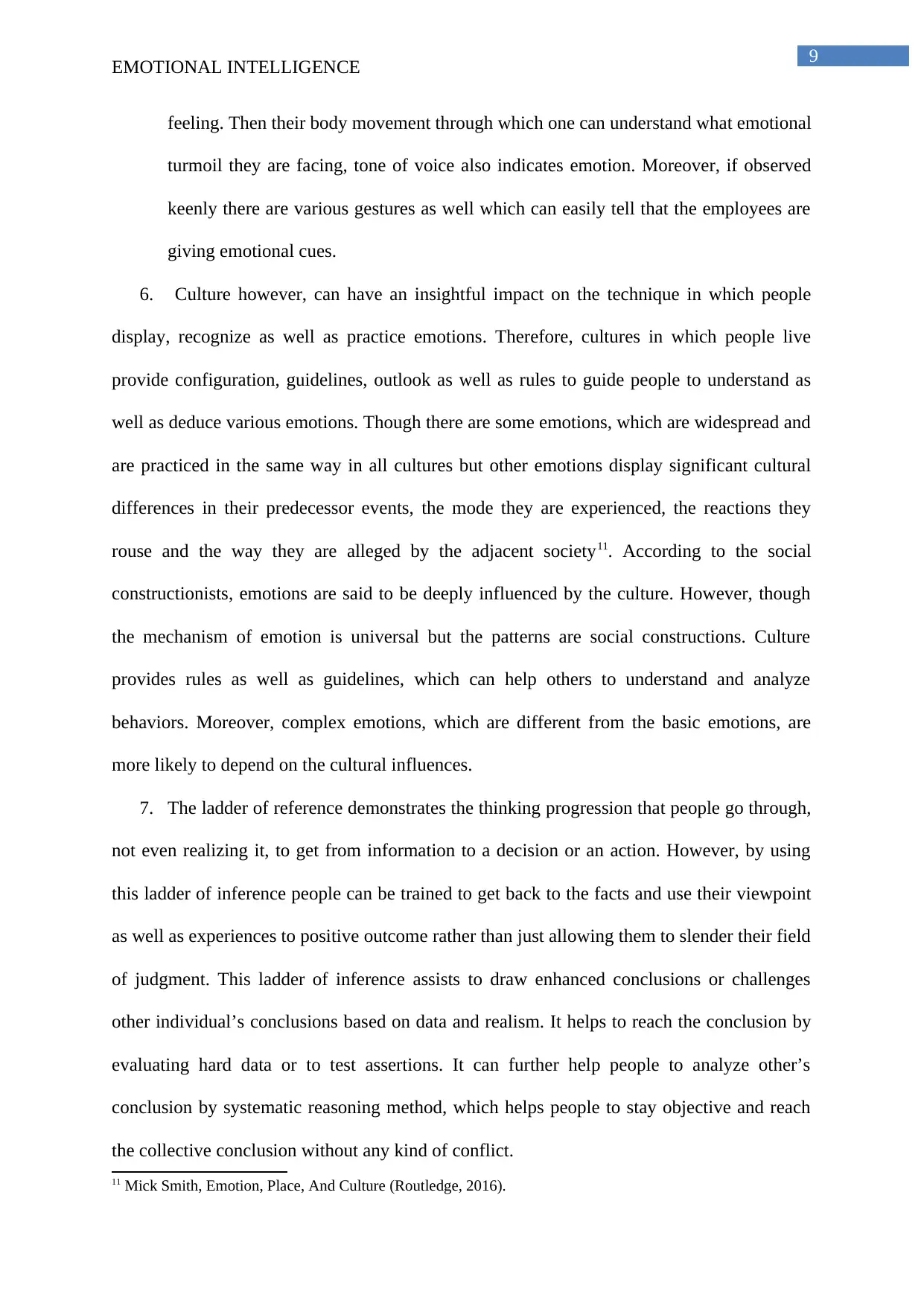
9
EMOTIONAL INTELLIGENCE
feeling. Then their body movement through which one can understand what emotional
turmoil they are facing, tone of voice also indicates emotion. Moreover, if observed
keenly there are various gestures as well which can easily tell that the employees are
giving emotional cues.
6. Culture however, can have an insightful impact on the technique in which people
display, recognize as well as practice emotions. Therefore, cultures in which people live
provide configuration, guidelines, outlook as well as rules to guide people to understand as
well as deduce various emotions. Though there are some emotions, which are widespread and
are practiced in the same way in all cultures but other emotions display significant cultural
differences in their predecessor events, the mode they are experienced, the reactions they
rouse and the way they are alleged by the adjacent society11. According to the social
constructionists, emotions are said to be deeply influenced by the culture. However, though
the mechanism of emotion is universal but the patterns are social constructions. Culture
provides rules as well as guidelines, which can help others to understand and analyze
behaviors. Moreover, complex emotions, which are different from the basic emotions, are
more likely to depend on the cultural influences.
7. The ladder of reference demonstrates the thinking progression that people go through,
not even realizing it, to get from information to a decision or an action. However, by using
this ladder of inference people can be trained to get back to the facts and use their viewpoint
as well as experiences to positive outcome rather than just allowing them to slender their field
of judgment. This ladder of inference assists to draw enhanced conclusions or challenges
other individual’s conclusions based on data and realism. It helps to reach the conclusion by
evaluating hard data or to test assertions. It can further help people to analyze other’s
conclusion by systematic reasoning method, which helps people to stay objective and reach
the collective conclusion without any kind of conflict.
11 Mick Smith, Emotion, Place, And Culture (Routledge, 2016).
EMOTIONAL INTELLIGENCE
feeling. Then their body movement through which one can understand what emotional
turmoil they are facing, tone of voice also indicates emotion. Moreover, if observed
keenly there are various gestures as well which can easily tell that the employees are
giving emotional cues.
6. Culture however, can have an insightful impact on the technique in which people
display, recognize as well as practice emotions. Therefore, cultures in which people live
provide configuration, guidelines, outlook as well as rules to guide people to understand as
well as deduce various emotions. Though there are some emotions, which are widespread and
are practiced in the same way in all cultures but other emotions display significant cultural
differences in their predecessor events, the mode they are experienced, the reactions they
rouse and the way they are alleged by the adjacent society11. According to the social
constructionists, emotions are said to be deeply influenced by the culture. However, though
the mechanism of emotion is universal but the patterns are social constructions. Culture
provides rules as well as guidelines, which can help others to understand and analyze
behaviors. Moreover, complex emotions, which are different from the basic emotions, are
more likely to depend on the cultural influences.
7. The ladder of reference demonstrates the thinking progression that people go through,
not even realizing it, to get from information to a decision or an action. However, by using
this ladder of inference people can be trained to get back to the facts and use their viewpoint
as well as experiences to positive outcome rather than just allowing them to slender their field
of judgment. This ladder of inference assists to draw enhanced conclusions or challenges
other individual’s conclusions based on data and realism. It helps to reach the conclusion by
evaluating hard data or to test assertions. It can further help people to analyze other’s
conclusion by systematic reasoning method, which helps people to stay objective and reach
the collective conclusion without any kind of conflict.
11 Mick Smith, Emotion, Place, And Culture (Routledge, 2016).
Paraphrase This Document
Need a fresh take? Get an instant paraphrase of this document with our AI Paraphraser
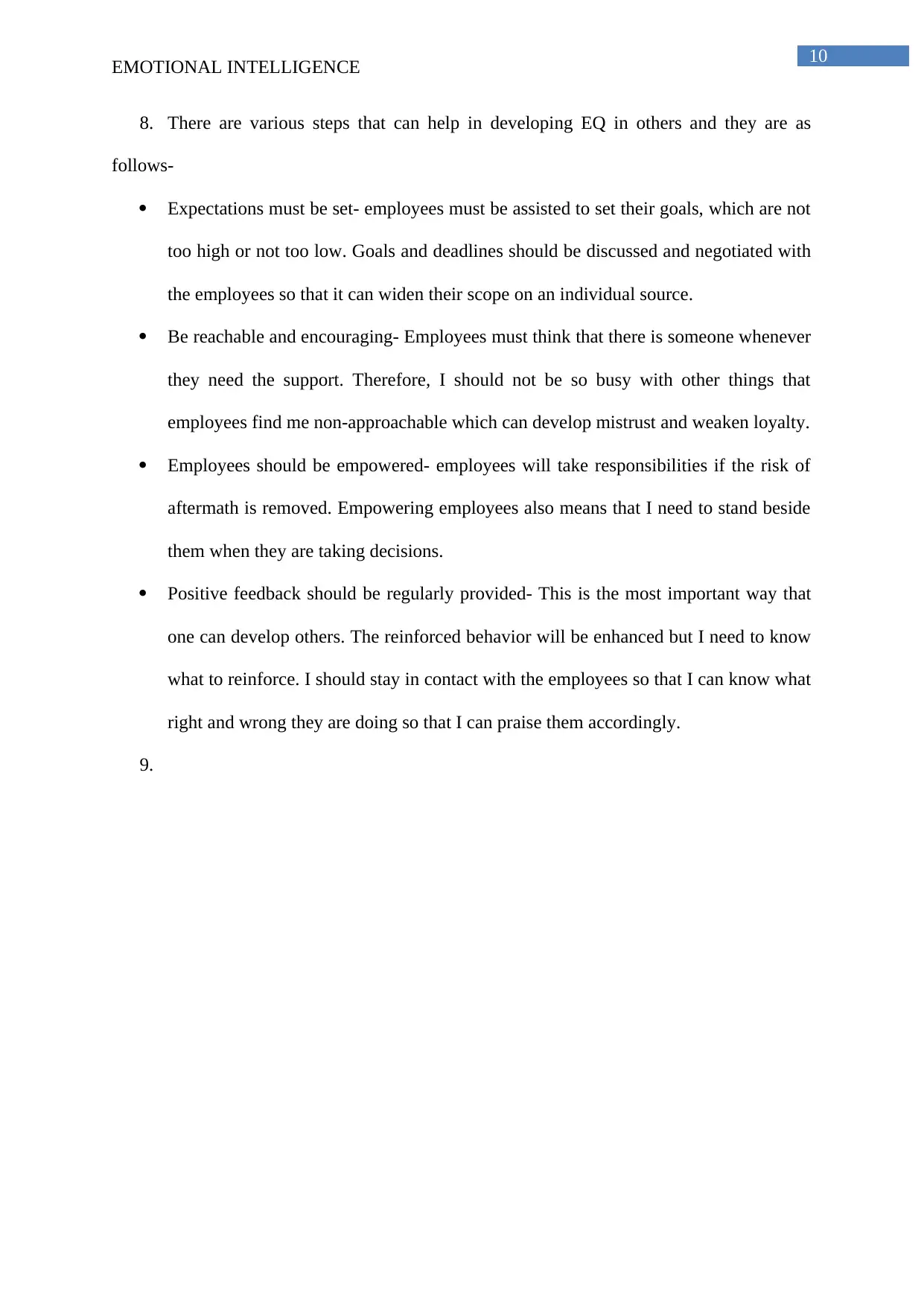
10
EMOTIONAL INTELLIGENCE
8. There are various steps that can help in developing EQ in others and they are as
follows-
Expectations must be set- employees must be assisted to set their goals, which are not
too high or not too low. Goals and deadlines should be discussed and negotiated with
the employees so that it can widen their scope on an individual source.
Be reachable and encouraging- Employees must think that there is someone whenever
they need the support. Therefore, I should not be so busy with other things that
employees find me non-approachable which can develop mistrust and weaken loyalty.
Employees should be empowered- employees will take responsibilities if the risk of
aftermath is removed. Empowering employees also means that I need to stand beside
them when they are taking decisions.
Positive feedback should be regularly provided- This is the most important way that
one can develop others. The reinforced behavior will be enhanced but I need to know
what to reinforce. I should stay in contact with the employees so that I can know what
right and wrong they are doing so that I can praise them accordingly.
9.
EMOTIONAL INTELLIGENCE
8. There are various steps that can help in developing EQ in others and they are as
follows-
Expectations must be set- employees must be assisted to set their goals, which are not
too high or not too low. Goals and deadlines should be discussed and negotiated with
the employees so that it can widen their scope on an individual source.
Be reachable and encouraging- Employees must think that there is someone whenever
they need the support. Therefore, I should not be so busy with other things that
employees find me non-approachable which can develop mistrust and weaken loyalty.
Employees should be empowered- employees will take responsibilities if the risk of
aftermath is removed. Empowering employees also means that I need to stand beside
them when they are taking decisions.
Positive feedback should be regularly provided- This is the most important way that
one can develop others. The reinforced behavior will be enhanced but I need to know
what to reinforce. I should stay in contact with the employees so that I can know what
right and wrong they are doing so that I can praise them accordingly.
9.
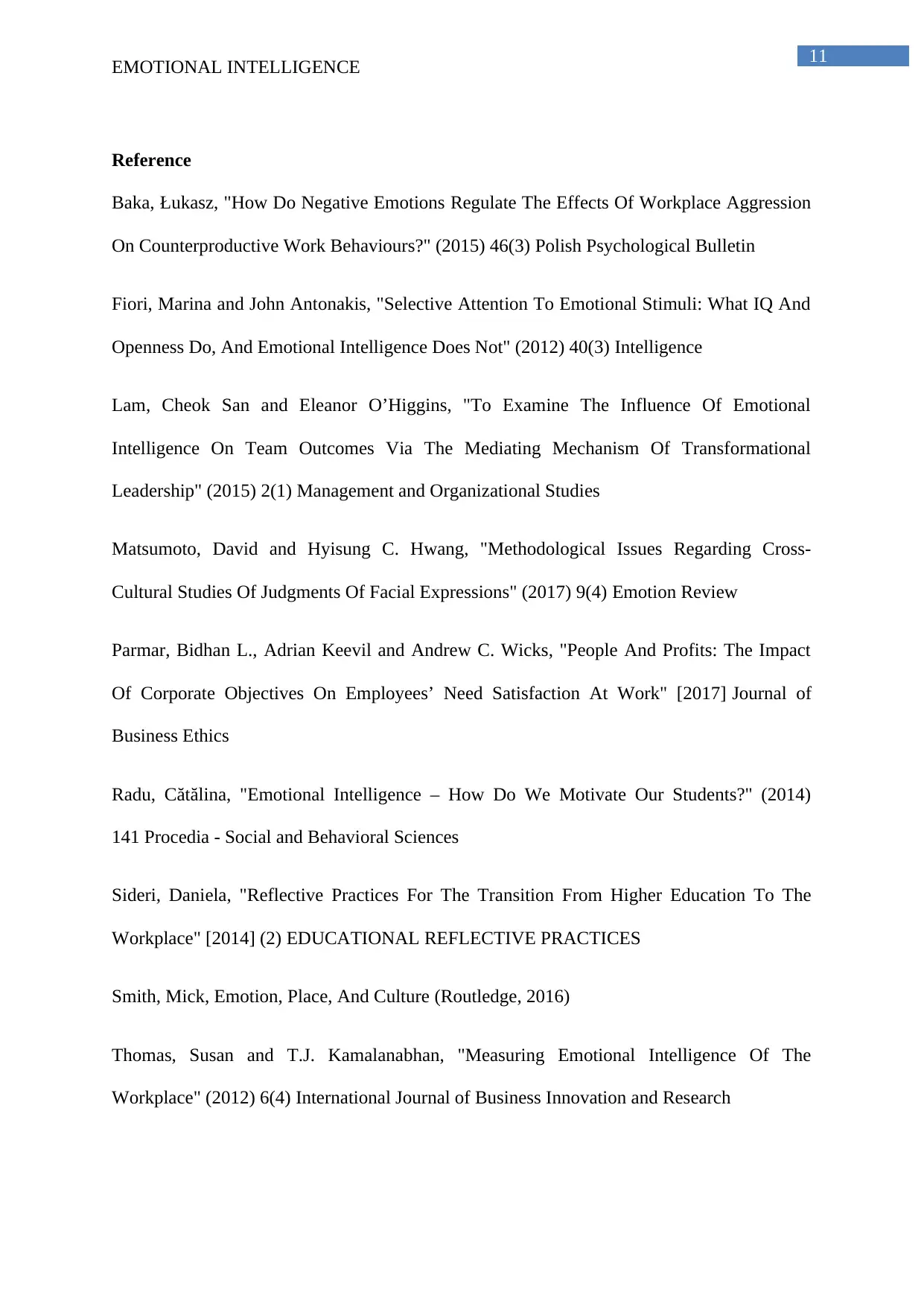
11
EMOTIONAL INTELLIGENCE
Reference
Baka, Łukasz, "How Do Negative Emotions Regulate The Effects Of Workplace Aggression
On Counterproductive Work Behaviours?" (2015) 46(3) Polish Psychological Bulletin
Fiori, Marina and John Antonakis, "Selective Attention To Emotional Stimuli: What IQ And
Openness Do, And Emotional Intelligence Does Not" (2012) 40(3) Intelligence
Lam, Cheok San and Eleanor O’Higgins, "To Examine The Influence Of Emotional
Intelligence On Team Outcomes Via The Mediating Mechanism Of Transformational
Leadership" (2015) 2(1) Management and Organizational Studies
Matsumoto, David and Hyisung C. Hwang, "Methodological Issues Regarding Cross-
Cultural Studies Of Judgments Of Facial Expressions" (2017) 9(4) Emotion Review
Parmar, Bidhan L., Adrian Keevil and Andrew C. Wicks, "People And Profits: The Impact
Of Corporate Objectives On Employees’ Need Satisfaction At Work" [2017] Journal of
Business Ethics
Radu, Cătălina, "Emotional Intelligence – How Do We Motivate Our Students?" (2014)
141 Procedia - Social and Behavioral Sciences
Sideri, Daniela, "Reflective Practices For The Transition From Higher Education To The
Workplace" [2014] (2) EDUCATIONAL REFLECTIVE PRACTICES
Smith, Mick, Emotion, Place, And Culture (Routledge, 2016)
Thomas, Susan and T.J. Kamalanabhan, "Measuring Emotional Intelligence Of The
Workplace" (2012) 6(4) International Journal of Business Innovation and Research
EMOTIONAL INTELLIGENCE
Reference
Baka, Łukasz, "How Do Negative Emotions Regulate The Effects Of Workplace Aggression
On Counterproductive Work Behaviours?" (2015) 46(3) Polish Psychological Bulletin
Fiori, Marina and John Antonakis, "Selective Attention To Emotional Stimuli: What IQ And
Openness Do, And Emotional Intelligence Does Not" (2012) 40(3) Intelligence
Lam, Cheok San and Eleanor O’Higgins, "To Examine The Influence Of Emotional
Intelligence On Team Outcomes Via The Mediating Mechanism Of Transformational
Leadership" (2015) 2(1) Management and Organizational Studies
Matsumoto, David and Hyisung C. Hwang, "Methodological Issues Regarding Cross-
Cultural Studies Of Judgments Of Facial Expressions" (2017) 9(4) Emotion Review
Parmar, Bidhan L., Adrian Keevil and Andrew C. Wicks, "People And Profits: The Impact
Of Corporate Objectives On Employees’ Need Satisfaction At Work" [2017] Journal of
Business Ethics
Radu, Cătălina, "Emotional Intelligence – How Do We Motivate Our Students?" (2014)
141 Procedia - Social and Behavioral Sciences
Sideri, Daniela, "Reflective Practices For The Transition From Higher Education To The
Workplace" [2014] (2) EDUCATIONAL REFLECTIVE PRACTICES
Smith, Mick, Emotion, Place, And Culture (Routledge, 2016)
Thomas, Susan and T.J. Kamalanabhan, "Measuring Emotional Intelligence Of The
Workplace" (2012) 6(4) International Journal of Business Innovation and Research
⊘ This is a preview!⊘
Do you want full access?
Subscribe today to unlock all pages.

Trusted by 1+ million students worldwide
1 out of 13
Related Documents
Your All-in-One AI-Powered Toolkit for Academic Success.
+13062052269
info@desklib.com
Available 24*7 on WhatsApp / Email
![[object Object]](/_next/static/media/star-bottom.7253800d.svg)
Unlock your academic potential
Copyright © 2020–2026 A2Z Services. All Rights Reserved. Developed and managed by ZUCOL.





